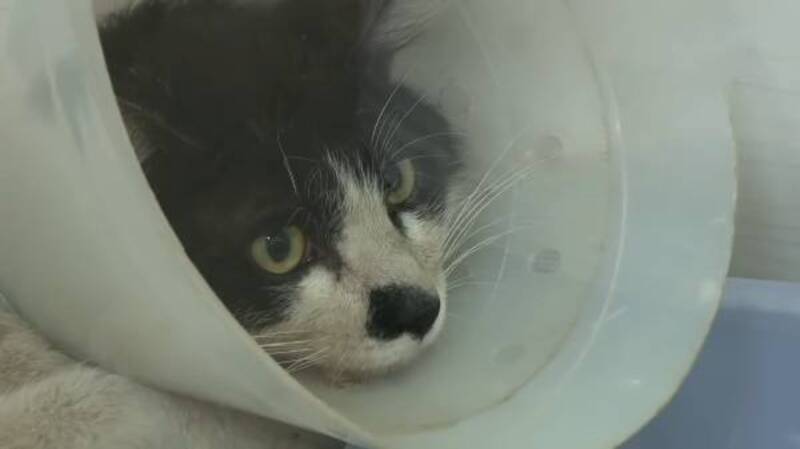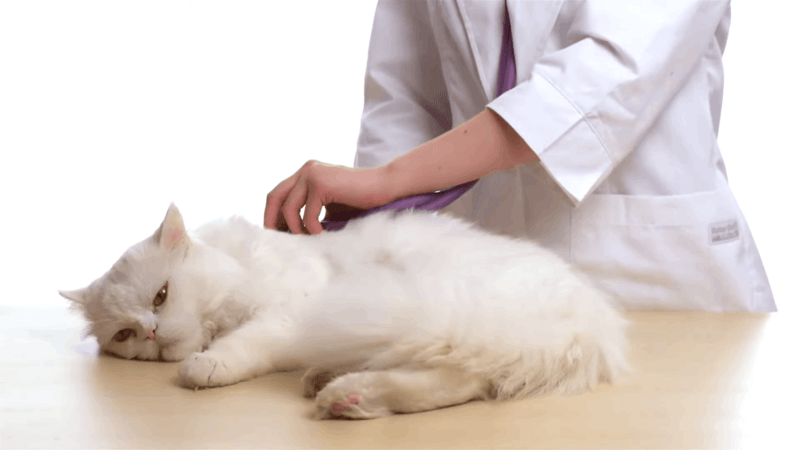No products in the cart.
CBD oil for cat skin allergies has become increasingly recognized for its potential therapeutic properties in managing various health conditions in both humans and animals. As cat owners seek effective solutions for their feline companions’ skin allergies, CBD oil has gained attention for its potential benefits in soothing inflammation and providing relief. However, it is crucial to understand potential side effects and consult with a veterinarian before using the best CBD for cats. In this blog post, let’s discover CBD oil for cat skin allergies, allergies in cats’ skin, and home remedies for cat allergies on skin.
What Is CBD Oil for Cat Skin Allergies?
CBD oil for cat skin allergies is known for its potential therapeutic properties and has gained popularity for its use in treating many health conditions in animals, including cat skin allergies. CBD oil for cat skin allergies is a specialized form of CBD oil that is specifically formulated to address and alleviate skin allergies in cats. It contains CBD, a compound derived from the cannabis plant, known for its potential therapeutic properties.

Benefits of CBD for Cats With Skin Allergies
CBD oil for cat skin allergies has the potential to alleviate skin inflammation caused by allergies. Here are some potential benefits:
- Anti-inflammatory effects: Itching, redness, and irritation, which are common symptoms of allergies, may be alleviated by CBD oil for cat skin allergies by lowering skin inflammation.
- Itch relief: CBD has been reported to alleviate itching and scratching in cats, helping to minimize further damage to the skin caused by excessive scratching.
- Skin barrier support: CBD oil for cat skin allergies may help strengthen the skin’s natural barrier function, promoting healthier skin and reducing the likelihood of allergens penetrating the skin.
- Calming effects: Some cats with skin allergies may experience anxiety or discomfort. CBD may have a calming effect, potentially reducing stress and anxiety related to allergies.
Side Effects of CBD for Cat Skin Allergies
Although CBD oil for cat skin allergies is often tolerated well by cats, it’s vital to think about any possible adverse effects, even if they are typically uncommon and mild. Some possible side effects may include:
- Sedation: Some cats may experience drowsiness or sedation from CBD oil for cat skin allergies, particularly at higher doses. It’s crucial to keep an eye on your cat’s reaction and modify the dosage as necessary.
- Dry mouth: CBD oil for cat skin allergies may temporarily reduce saliva production, leading to a dry mouth. Make sure your cat has the opportunity to drink fresh water and stay properly hydrated
- Drug interactions: CBD oil for cat skin allergies may interact with certain medications, so it’s crucial to consult with a veterinarian before administering CBD to a cat taking other medications.
- Digestive upset: In some cases, cats may experience mild digestive issues such as diarrhea or changes in appetite when first starting CBD. Monitor your cat’s response and adjust the dosage if necessary.
What Are Allergies in Cats’ Skin?
Cats develop skin allergies when their immune systems respond to specific environmental factors. These can be things like pollen, certain foods, fleas, or even certain materials. When a cat with allergies is exposed to these triggers, it can result in various skin reactions such as itching, redness, inflammation, rashes, hives, hair loss, or the development of open sores.

Causes of Skin Allergies in Cats
There are several potential causes of skin allergies in cats, including:
- Environmental allergens: Cats can develop allergies when exposed to common environmental triggers such as pollen, dust mites, mold spores, or specific plants.
- Food allergies: Certain dietary ingredients, such as cereals like wheat or corn or proteins like beef, fish, or chicken, might cause allergies in some cats.
- Flea allergies: Cats can have an allergic reaction to flea saliva, leading to severe itching and skin irritation even with just one flea bite.
- Contact allergies: Cats may develop allergies to substances they come into direct contact with, including certain fabrics, cleaning products, or grooming products.
- Parasites: External parasites like mites or lice can cause skin allergies in cats.
Symptoms of Cat Skin Allergies
Common symptoms of skin allergies in cats include:
- Itching (pruritus): Cats with skin allergies often suffer from severe itching, which results in frequent scratching, licking, or biting of the affected areas.
- Scratching: Cats may scratch themselves excessively, attempting to relieve the itchiness caused by allergies. This can result in hair loss and skin damage.
- Excessive grooming: Allergic cats may engage in excessive grooming behavior, often focusing on specific areas of their body, in an attempt to alleviate discomfort.
- Redness (erythema): The skin affected by allergies may appear reddened, indicating inflammation and irritation.
- Inflammation: Allergic responses can result in skin inflammation, making it puffy, sensitive, or heated to the touch.
- Skin rashes: Allergies can manifest as skin rashes, characterized by areas of raised, reddened, or bumpy skin.
- Hives (urticaria): An allergic reaction can result in the skin developing raised welts or bumps known as hives.
- Hair loss (alopecia): Excessive scratching or grooming due to allergies may lead to localized or generalized hair loss in affected areas.
- Open sores (ulceration): Prolonged scratching or biting can cause the skin to break, resulting in open sores or ulcers.
Distinguishing Allergic Reactions and Other Skin Conditions in Cats
Specifying allergic reactions and other types of skin problems in cats can be challenging. However here are some ways to identify it:
- Flea allergies: Fleas or flea filth on a cat’s fur can indicate a flea allergy.
- Seasonal patterns: If the symptoms occur during specific times of the year, it may suggest environmental allergies.
- Response to treatments: Allergic reactions may respond to treatments like antihistamines or corticosteroids, whereas other conditions might require specific treatments.
- Veterinary examination: A veterinarian can perform tests, such as skin scrapings, cultures, or allergy tests, to identify the underlying cause and differentiate between allergies and other skin conditions.
Common Home Remedies for Cat Skin Allergies
While home remedies can provide some relief, it’s important to consult with a veterinarian for proper diagnosis and guidance. Here are a few common home remedies for cat allergies on the skin:
- Regular bathing: gently bathe your cat with a hypoallergenic shampoo or a gentle oatmeal-based shampoo To soothe the skin and remove allergies.
- Cool compresses: Apply a cool, damp cloth or compress to irritated areas to alleviate itching and inflammation.
- Omega-3 fatty acids: Including fish oil or other omega-3 fatty acid sources in your cat’s diet may improve skin health and reduce inflammation.
- Epsom salt soak: Dissolve Epsom salt in warm water and use it as a soak for your cat’s paws or affected areas to provide relief from itching and inflammation.
- Herbal rinses: use diluted solutions of herbal rinses such as chamomile or calendula To soothe inflamed skin. Always ensure they are safe for cats and consult with a veterinarian before use.
Keep in mind that these remedies just offer temporary relief, it is essential to find and treat the root of the allergies.

Tips for Creating a Cat-Friendly Environment to Minimize Skin Allergic Reactions
To minimize allergic reactions in your cat, here are some tips:
- Regular cleaning: cleaning and dusting your home frequently to reduce allergens like dust mites, pollen, and pet dander.
- Allergen-proof bedding: Use hypoallergenic bedding and wash it regularly to minimize allergens.
- Air purification: To help remove allergies from the air, consider using high-quality air purifiers or filters.
- Minimize potential irritants: Avoid strong scents, smoke, and harsh cleaning products that can irritate your cat’s allergies.
- Regular grooming: Brush your cat to remove loose fur and reduce the amount of allergens on its coat.
- Maintain proper humidity: Keep the humidity in your home at an optimal level to prevent dry skin and potential irritation.
- Keep a clean litter box: Scoop the litter box daily and consider using dust-free or low-dust litter to minimize respiratory irritants.
- Monitor outdoor access: Once your cat goes outside, be aware of potential allergens such as pollen and grasses.
Natural Topical Treatments That Can Help Alleviate Cat Skin Allergy Symptoms
Some natural topical therapies may help ease cat skin allergy symptoms, but it is critical to seek the advice of a veterinarian. Here are a few options to consider:
- Chamomile: It can be brewed into a weak tea and then diluted with water. Applying this chamomile solution as a compress or rinsing the affected area can help calm irritated skin, reduce redness, and alleviate itching.
- Apple cider vinegar: Diluted apple cider vinegar can be applied topically to help relieve itching and irritation.
- Witch hazel: Witch hazel has anti-inflammatory properties and works as a mild astringent to reduce inflammation and itching.
- Oatmeal: An oatmeal bath or a paste made from ground oatmeal and water can provide relief from itching and soothe irritated skin.
- Coconut oil: Applying organic, unrefined coconut oil will hydrate and calm dry, irritated skin.
Conclusion
CBD oil has shown promise in soothing skin inflammation and providing relief from itching, redness, and irritation caused by allergies. However, it’s important to be aware of potential side effects and consult a veterinarian before giving CBD to your cat. Skin allergies in cats can be triggered by environmental factors, food allergies, fleas, contact allergies, or parasites. Each cat is unique, and a personalized approach, along with professional guidance, is crucial for their well-being. By addressing the underlying causes of allergies and providing proper care, you can help your cat lead a more comfortable and allergy-free life.
I am Nelson Cooper, I pursue my passion for writing and my belief is that cats love humans. I enjoy traveling and have a deep appreciation for the beauty of nature, as well as a soft spot for animals, particularly cats.



